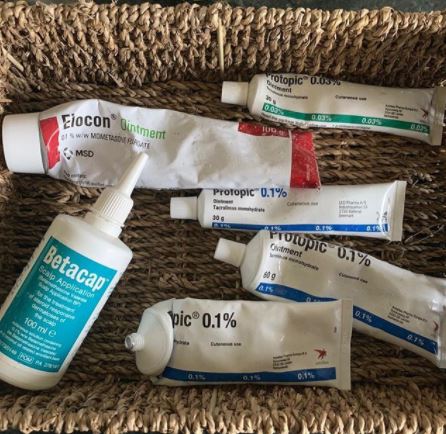What are the current treatment pathways for adults with eczema? You might be surprised to know that there are actually no NICE guidelines for adults with eczema, so it’s no surprise doctors and dermatologist simply follow the protocols, that have not changed for far too long.
We all know are how outdated the current guidance can be and we need change.
What is the future for eczema treatment?
There is change coming, in the form of new treatments and more forward thinking about holistic solutions, talking therapy, diet and allergy testing. But what we also need is recognition that Topical Steroid Withdrawal is a real condition and furthermore, help, support and research to help those facing this condition.

You can read the NICE guidelines for eczema here.
Current treatment pathways for eczema in the UK
This is traditionally what will happen in the UK
- Emollients – the first line if defence. Often starting with the cheapest, least effective alternatives. Push harder for options without paraffin and no preservatives. They do exist. Epimax do a paraffin free emollient. If you can afford to, try to incorporate some natural skin care products such as Balmonds and lyonsleaf balms. Click here for Discounts and Promo codes.
- Topical Steroids – Beginning with the weakest, Hydrocortisone, and increasing the the strongest, Dermovate and Betnovate to name a few. For transparency I am no longer using any topical steroids. I stopped using them in January 2019 and have been in steroid withdrawal ever since.
- Topical Immunosuppressants – (Tacrolimus) Elidel or Protopic for treating eczema, can work really well. I used it on my face for about five years but I think this is causing me the most challenges with healing after stopping using them in April 2019, I am still going through quite severe withdrawal three years later. You might be thinking, is it worth it for all the pain? Well it’s not always been like this, I have had periods of quite stable skin and almost normal life experiences but this healing isn’t linear it would seem. Read Protopic Withdrawal and TSW.
- Immunosuppressants – Oral immunosuppressants such as ciclosporin, methotrexate, azathioprine and mycophenolate mofetil, can work well at supressing the immune response. I used methotrexate for about six months, a drug administered to cancer patients on much larger doses. It was highly monitored, you had to have regular blood tests and check the dose you took was correct each week. I was never happy using it and gave up when my immune system hit rock bottom and l it gave me shingles, the most hideous painful experience of my life, without a doubt. I decided I didn’t want to suppress my immune system any more and am choosing to heal naturally. It did improve my skin slightly but my dermatologist wasn’t really happy with the results. Perhaps it gave me an easier time during TSW, or maybe it just delayed healing, I’ll never really know.
- Biologics – Dupixent (Dupilomab) – for treating moderate to severe atopic dermatitis in adults. A biologic is a drug made from biological (living) sources like cells from humans, animals, plants, fungi or microbes. Biologic drugs are sometimes called “biologic response modifiers” because they change a process already occurring in cells or for a particular disease. In AD, new biologic drugs can modify the elevated immune response driving the disease. In my opinion this is STILL an immune suppressant, albeit perhaps more targeted. I’m not every so keen on what it’s made from either as I’ll bet it doesn’t say, ‘made from humans’ or ‘made from animals’ on the label. A vegan might not want to use this if it was derived from animals.
Less invasive treatments – if you’re lucky
These are often not offered by doctors or dermatologists unless patients push for them. The general thinking is that we all ‘just have eczema’ and that it’s not caused by anything. That it’s just random. This outdated now as we know that it can be triggered and exacerbated by many things, including contact and food allergens, skin care products, pollution, stress, alcohol and lifestyle, to name just a few. The following treatments may help you get the bottom of your skin journey but you’ll generally have to push and ask for them.
- Patch testing
- UVB therapy and PUVA phototherapy
- Skin prick testing for allergies
- Paste bandages and wet wraps.
- Blood testing for allergies
- Blood tests for vitamin, mineral deficiencies and other potential problems
- Dietary advice
- CBT Therapy
Future treatments and therapies
- Topical Steroid Withdrawal Support – This isn’t available in many places. Guy and St Thomas’s London dermatology clinics has a High Acuity Day Centre, for anyone really struggling with help on wet wrapping, baths to help eczema, how to bandage wounds and rest and respite. Thanks to Olivia for telling me about this, they do and will push steroids and other mainstream treatments, but did listen to her and explain what else might help. She also had blood tests and was prescribed Folate, iron and vitamin D – I think these sort of tests are often overlooked and could help lots of people with eczema. On the whole though, there is nothing to support anyone going through Topical Steroid Withdrawal unless they wish to choose one of these new drugs to try. What I’d love to see is some kind of therapy and holistic support of some kind. It’s very hard doing it on your own. The medical profession also needs to see this condition under a microscope if it is ever to accept, understand and manage it in the future. I fear it is a problem that could grow in the future.
- Tralokinumab: a new biological drug that is some time away from widespread release. This medication will be very similar to Dupixent, but where Dupixent blocks two targets, this new medication will only block one. To this point, the trials have been highly successful and promising.
- Baricitnib – People with moderate to severe atopic dermatitis that has not responded to at least 1 systemic immunosuppressant are usually offered either dupilumab or best supportive care. Dupilumab does not always work, and some people stop taking it because of side effects.. Baricitinib is an alternative to dupilumab and best supportive care. It is likely to be offered alongside topical corticosteroids.
- Targeting enzymes – A new class of medications to target enzymes: Pfizer is working on an oral medication that a person can take once each day to control eczema symptoms. If successful, this medication will target a new group of enzymes related to the inflammation that coincides with the condition
- Cibinqo® (abrocitinib), from manufacturer Pfizer, has been approved by the U.S. Food and Drug Administration (FDA). Cibinqo is an oral Janus Kinase (JAK) inhibitor medication for adults (18+) living with refractory, moderate to severe atopic dermatitis (AD) whose disease is not adequately controlled with other systemic drug products, including biologics, or when use of those therapies is inadvisable. JAK inhibitors can target one or more of these family members to block these immune signals and inhibit the inflammatory effect of key cytokines involved in AD. Cibinqo works by selectively blocking JAK1 resulting in improvement in AD signs and symptoms.
- Tezepelumab is currently in phase 2 studies and look at inhibition of t-cell activity .
- New research into new antihistamines that work on a different histamine response and could help eczema itch more than the ones we currently have.
- Bleach baths – there is some evidence that dilute bleach and similar chemicals can have anti-inflammatory properties on the skin. It’s an area that needs more work – one of those areas that’s included in old textbooks but which hasn’t been properly assessed. ( I really don’t like this one – how can bleach on the skin be good even in diluted quantities?)
There may be more treatments that I’ve not identified yet and I will update this blog as I find them. For instance, Red Light Therapy, which I’m trying at the moment (April 2024)
And please let me know if I’ve got anything wrong or missed anything off.
What do we need in the future? Are these future treatments better than what came before? Are they safer?
Further reading
Read A dermatologist discusses the future of eczema care here, By Jonathan Silverberg. He has set up a multidisciplinary treatment centre in America looking at allergists, neurologists and sleep specialists, in addition to board-certified dermatologists. Also visit his website at https://revolutionizingad.com/
Also Eczema Research Pipeline from the National Eczema Society












Leave a Reply